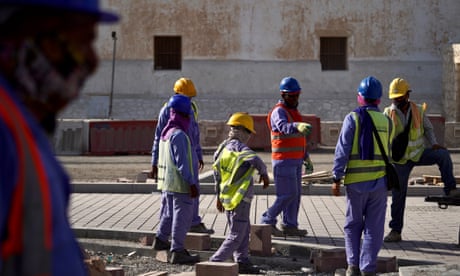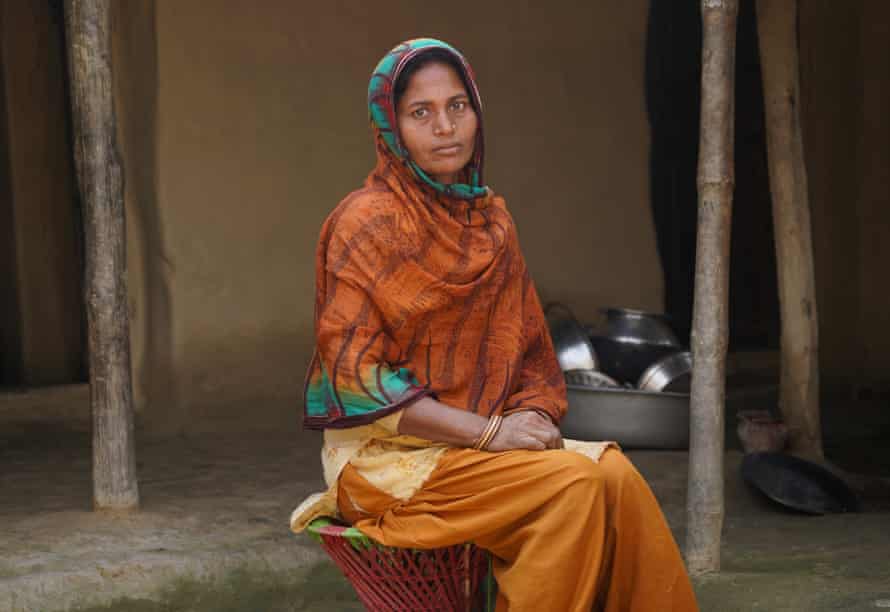Nepalese men say goodbye to friends and family outside Kathmandu’s international airport before heading to jobs in the Gulf. Photograph: Pete Pattisson
Guardian investigation finds labourers – including those on World Cup-related projects – were left with huge debts
Low-wage migrant workers have been forced to pay billions of dollars in recruitment fees to secure their jobs in World Cup host nation Qatar over the past decade, a Guardian investigation has found.
Bangladeshi men migrating to Qatar are likely to have paid about $1.5bn (£1.14bn) in fees, and possibly as high as $2bn, between 2011 and 2020. Nepali men are estimated to have paid around $320m, and possibly more than $400m, in the four years between mid-2015 to mid-2019.
The total cost incurred by Qatar’s low-wage migrant workforce is likely to be far higher because workers from other labour-sending countries in south Asia and Africa also pay high fees.
Migrants from Bangladesh and Nepal, who make up around a third of Qatar’s 2-million strong foreign workforce, typically pay fees of $3,000 to $4,000 and $1,000 to $1,500 respectively. This means that many low-wage workers from Bangladesh – who can earn as little as $275 a month – have to work for at least a year just to pay off their recruitment fees.
With just months to go until the World Cup kicks off, the findings reveal the scale of exploitation endured by some of the world’s poorest workers, including many who have been employed on World Cup-related construction and hospitality projects.
The figures, which have been calculated by the Guardian and corroborated by a number of labour rights groups, are an estimate based on the prevalence and cost of recruitment fees and related expenses reported by numerous human rights groups and labour experts between 2014 and 2022.
The charging of recruitment fees is illegal in Qatar and – beyond a maximum limit – in Nepal and Bangladesh, but the practice is widespread and deeply entrenched. It is commonplace in all the Gulf countries. The figures calculated by the Guardian include all fees, including those within the maximum limit.
It takes different forms, but often sees companies or brokers in Qatar and recruitment agents in labour-sending countries colluding to force workers into paying for their own recruitment. The fees are paid to agents in workers’ home countries before departure.
Workers often have to take out high-interest loans or sell land to afford the fees, leaving them vulnerable to debt bondage – a form of modern slavery – as they are unable to leave their jobs until the debt has been repaid.
Despite the costs, hundreds of thousands of Bangladeshi and Nepali workers continue to seek work in the Gulf and beyond each year, largely due to a lack of jobs and low wages at home. Many pay the fees knowing the risks but calculating that it will pay off in the long term.
Their dilemma was plain to see in the departure hall at Kathmandu’s international airport, where workers made hurried video calls to their families, thick red “tikka” smeared on their foreheads; a symbol of good wishes from friends.
“I’m feeling really worried,” said one worker, going abroad for the first time. “But I have to go. I have money problems.”
Another, taking up a construction job in Qatar, waved goodbye to his baby son on his phone. “I’m so sad to be leaving my children,” he said. “I paid 150,000 [Nepalese] rupees [NPR] [$1,230]. The agent told me, ‘If you want to go, you have to pay’.”
The Qatari authorities say they have taken steps to address the problem by opening recruitment centres in eight countries, starting in 2018, where workers must go to complete various administrative tasks and sign their contracts before departure.
While the centres may have reduced the incidence of “contract substitution” – where workers find different terms and conditions in Qatar to what they were promised at home – experts said they have done little to curb recruitment fees, because these are paid much earlier in the recruitment process.
A 2021 report on recruitment between Nepal and Qatar led by migrant rights group FairSquare said Qatar has “largely seen recruitment and fee payment as an origin state concern, and recruiters have generally been subject to relatively limited regulation”.
However, the local organising committee of the World Cup introduced a scheme in 2018 to ensure companies with stadium contracts repay the recruitment fees of their workers, as well as some workers on other projects. Workers are not required to show proof that they have paid fees, which is almost impossible to do given that the practice is illegal. Companies have pledged to repay roughly $28.5m to about 49,000 workers. So far around $22m has been reimbursed.
The number of workers who will benefit, however, is only a tiny fraction of the total in Qatar. In many cases, the repayments only cover part of the recruitment fees, and do not provide any additional compensation or account for the cost of the workers’ loans.

The supreme committee organising the World Cup said in a statement, “We remain committed to delivering the legacy we promised. A legacy that improves lives and lays the foundation for fair, sustainable, and lasting labour reforms.”
Narad Nath Bharadwaj, a former Nepal ambassador to Qatar, called the practice a “gruesome story”, saying more than 90% of workers pay fees.
“Payment is illegal and mostly takes place under the table, so the workers have no proof they have paid. But they are unable to get a job if they do not pay 150,000 or 200,000 NPR. For better jobs the rate is higher,” he said.
While some workers are recruited for free or minimal cost, the vast majority are forced to pay; often victims of deals between employers and agents in Qatar and a chain of recruiters and brokers in Nepal and Bangladesh.
In some cases, employers or agents in Qatar secure visas to recruit workers and then demand kickbacks of about $300 to $500 for each worker from agents in labour-sending countries in exchange for the visas, the cost of which is passed on to workers.
A report for the Qatar Foundation said: “The costs borne by workers … are essentially ‘bribes’ demanded (extorted) by recruitment agents to secure the jobs in Qatar for which they enter into debt with high-interest rates.”
Bangladeshi workers, like Aman Ullah, pay by far the highest fees. In 2016, Ullah was charged 360,000 taka ($4,190) for a job in Qatar. He was promised work as a welder on a monthly wage of 2,500 Qatari rial ($686), but on arrival, he was taken out to the desert to work on a farm for 800 rial.
“There was no limit to the work,” he said. “We had no electricity or air-conditioning and were not allowed to leave the compound.” His employer would not let him return home until he begged for permission to visit his sick mother. Back in Bangladesh, with nothing to show for his time in Qatar, his debt had ballooned to 800,000 taka forcing him to take out further loans to pay off the original debt.
Even in death, workers are not released from their recruitment debt. Hoping to earn money for his daughter’s dowry, Mahamad Nadaf Mansur Dhuniya, from Nepal, paid an agent 150,000 NPR for a construction job in Qatar in 2018. He could only afford the fee by taking out a loan with an annual interest rate of 48%. Last year, he was found hanging in his workplace.

His wife, Mairul Khatun, is unsure why he killed himself. “I think it may have been the pressure of the loan, his daughter’s marriage, the need to look after his family,” she said, from her home in southern Nepal.
Her hands and feet are smeared in mud from labouring in the nearby fields, for which she earns 300 NPR a day and a few potatoes, which lie on the ground beside her.
She may have lost her husband, but his debt remains. “I have a lot of tension now. Before, we sometimes ate meat and milk but we’ve stopped now. How can we afford these things?” Khatun said. “I can’t sleep at night.”
The Qatar government said companies involved in illegal recruitment practices have been severely punished. Twenty four recruitment agencies were recently shut down and had their licences revoked for breaking Qatar’s laws.
A spokesperson said: “There are complex challenges that need to be overcome to protect economic migrants globally, including in Europe. For its part, Qatar is committed to eradicating illegal recruitment practices in its labour market and supporting efforts to tackle abuse and exploitation throughout the global economy.”
Dr Ahmed Munirus Saleheen of Bangladesh’s ministry of expatriates’ welfare and overseas employment said: “The government of Bangladesh is strongly committed to ensuring safe, orderly, regular and responsible work migration.”
He blamed “visa trading” by middlemen in both the country of origin and destination for the high cost of recruitment and said legal action was immediately taken against recruitment agencies when complaints of unfair recruitment practices were received.
The Nepal government did not respond to repeated requests for comment.
